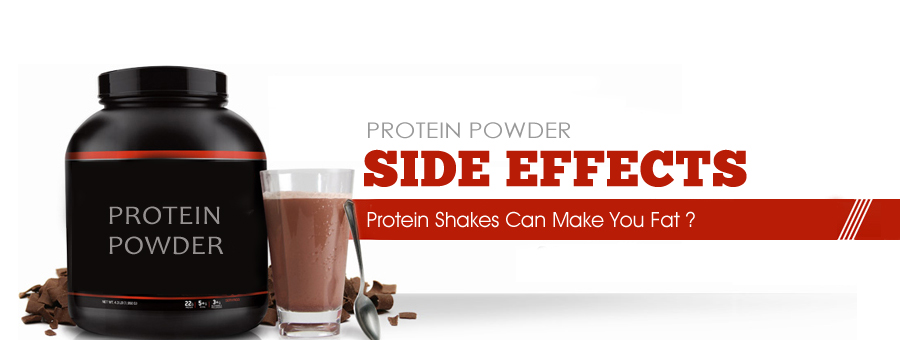
Protein Shakes Can Make You Fat / Cause Weight Gain. True or False?
There is a myth that a healthy diet is just about ingesting more and more protein. Wrong! You need protein but along with carbs and fats. But, majorly you need REAL solid food and well-balanced diet. Try adding nutrient-dense or high-quality protein products like grass-fed meats, organic cage-free poultry or eggs, and wild-caught fish.
Protein supplements do help in post-workout recovery, stimulate energy, focus, memory, and helps building and maintaining muscle. If your diet is high in meat, then there are chances that you aren’t protein deficient at all. So, before opting for a supplement consult a doctor or a nutritionist else you might end up gaining weight.
Before we arrive at a conclusion and answer Protein Supplement, Make You Fat/ Cause Weight Gain. True or False? Let’s explore what various renowned nutritionists and researchers have to say:
Jackie Buell, an assistant professor and sports dietitian at the Ohio State University, explains that protein can stimulate an insulin response, which sends the body into storage mode.
This means that the body has the potential to transform the calories from excess protein to fat. However, no study or research has revealed that how much protein you can consume before the body starts converting protein to fat. In fact, the protein-to-fat-transformation threshold is pretty high.
If you are a die-heart fan of casein protein, then you must know what a 2016 study in the Journal of Nutrition and Metabolism stated. They found that when 3.3g of protein/kilogram of body weight per day (g/kg/d) was consumed for four months, the subjects didn’t gain any fat, nor there were any changes to blood lipids or liver and kidney function.
In fact, a small research conducted in 2016 outlined in the Journal of the International Society of Sports Nutrition that when healthy guys took up to 3.3g/kg/d of protein coupled with strength regimen, they lost fat over the four months.
Journal of the International Society of Sports Nutrition published a study that stated – when trained and healthy fitness enthusiasts upped their protein to 4.4g/kg/d—that’s way beyond the recommended value—their body fat didn’t go up over two months. (Note that one of the study authors of this research was the CEO of the ISSN, which is sponsored by two supplement companies that supplied proteins for the study.)
That’s not it. The associate director of the Institute of Sports Sciences & Medicine at Florida State University says that Protein higher than 0.8g/kg/d would benefit most people, except the ones with pre-existing health or kidney medical issues. According to him, the body utilizes the protein in many ways. It is the liver that decides how to use the amino acids. It might use the amino acids to make more proteins, or make glucose or store it as fat. This largely depends on the structure of the amino acid.
He also said that protein does not matter. It is the overall calorie count that should be considered. Over-consuming calories will lead to weight gain, irrespective of the nutrient. And, protein powders do have calories. Every gram of protein has about four calories; i.e., 20g of protein has 80 calories, excluding the additional fat and carbs.
Ormsbee suggests that to minimize the risk of an increase in body fat while having protein focus on a meal’s protein count, and complete the plate with healthy carbs, fats, and vegetables. Time the protein intake rightly. Couple protein with regular exercise and pace the daily protein intake of 2g/kg over 5 to 6 meals per day, about every three hours. Both men and women of all physical builds can improve their body composition without gaining fat, and this was stated in an extensive research conducted by Paul Arciero, D.P.E., at the Skidmore College.
Consider all that and avoid the following three mistakes too:
Don’t Mix Protein Shake with Milk
Do not load your protein shake with almond butter or sweetened nut milk, because you will then be ingesting a significant amount of sugar. So, do not dump everything in your fridge.
Check the Protein brand you are taking
Consider taking Whey or Casein proteins only; as both these proteins are complete with necessary amino acids. Whey is a total protein and derived from cow’s milk. Thus, avoid it if you are allergic to lactose. Casein takes time to digest, but like Whey it is derived from dairy too.
Note that your protein has minimal ingredients and the majority of them are derived from real food. Avoid the ones with Caffeine and toxic minerals.
Do not overload your body with scoops and scoops of Protein
The question here is, what exactly is too much protein? The answer to this is 1g of protein per 10lbs of body weight.
In a research conducted it was found that about 7,000 adults who ate a high protein diet were 90% likely to become overweight than the ones who consumed less.
Also, protein overdose can damage your kidneys by making them work harder to get rid of the extra nitrogen.
There are ample of ways to increase your protein intake without scooping enhancers into your protein shake. So, get up and walk down the lane to your grocery store and get meat, dairy, eggs, and fish; make an exercise schedule and stick to it!